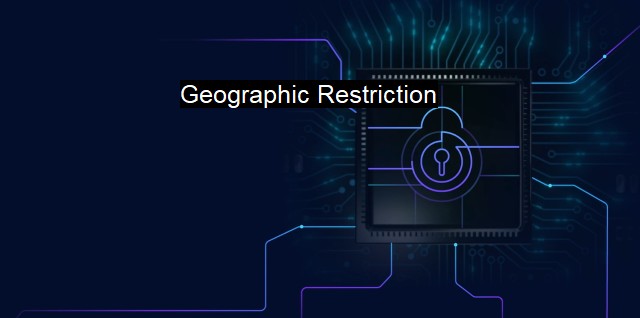What is Geographic Restriction?
The Limitations of Antivirus Software: Exploring Geographic Restriction as a Cybersecurity Concern
Geographic restriction, otherwise known as geoblocking, is a technique frequently used in online business and cyber security. It allows organisations to control and regulate the accessibility, display, and use of digital content or protocols depending on the geographical location of the visitor, user or consumer. This restriction allows for different kinds of accessibility rights to different regions, creating a sense of exclusivity. Today we explore this concept in-depth, its application and its relation to antivirus.Geographically restricted access is put into action through different methods like IP tracking, radio frequency GPS (Global Positioning Systems), GSM (Global System for Mobile Communication) or RFID (Radio Frequency Identification Device). The software or system checks both the source and the destination of a data packet using these methods to evaluate if it has permission. Being highly dependent on geographical locations, political laws, restrictions, entertainment laws, and socioeconomic factors come into play.
Across numerous online platforms - be it gaming, media streaming, or telecommunication companies - there is a common setting for geographically restricting access to certain locations. When users try to access restricted content with an IP address from an unapproved location, they see a message stating that the content is not available for their region.
In the cybersecurity context, geographic restriction provides a benefit by limiting potential cyber threats from specific regions globally notorious for their cybercriminal activities. Cybersecurity firms can geoblock malicious IP addresses connected with potential cyberattacks, such as Distributed Denial of Service (DDoS) attacks, that compromise the security of a system or network. Thus, geographic restriction gives an added layer of protection by forestalling attacks before they even commence.
Traffic regulation is a pivotal advantage of georestrictions. Cybersecurity companies can check and control the network traffic flow in a path secured with georestrictions, safeguarding sensitive data from would-be hackers and cyber criminals. When enterprises run online operations, sectors with higher potential risk can be geographically blocked, thereby mitigating security risks.
In terms of antivirus application, geographic restriction can add an extra layer of security by blocking the access or spread of malicious codes and viruses originating from certain geographic areas. An antivirus program often works by detecting, preventing, and removing malicious software. By incorporating georestrictions into an antivirus program, cybersecurity personnel can efficiently supervise and corner potential threats.
That said, geographic restriction has its downsides; one is unjust exclusion. Innocent users may not access necessary resources due to their geographical location falling under a risk-prone area, or they may be blocked due to an IP that had previously been used in cyberattacks. To bypass these restrictions, users might choose Virtual Private Networks (VPNs), as they can disguise their actual location and ensure confidentiality.
Though excluding traffic from suspicious regions can reduce the chance of attacks, it won't eliminate it. Cybercriminals maintain their staying power through Resourcefulness, and they use methods such as IP spoofing, making geographic restrictions an imperfect solution.
Though not an impenetrable defense, geographic restriction serves as an effective measure to fortify one's cybersecurity. It assists security protocols and antivirus programs to shield organisations and users from potential threats. As a part of a more comprehensive cybersecurity strategy, where geographic restriction complements other strategies like data encryption, secure private networks, and antivirus software, businesses can strive to protect their systems and users from potentiallyacute cyber threats. in today's era of increasing digitalisation, being well-versed in cybersecurity measures like geographic restriction is of utmost importance in anticipation of potential threats and attacks.

Geographic Restriction FAQs
What is geographic restriction in cybersecurity and antivirus?
Geographic restriction refers to the practice of limiting or blocking access to certain online content, services, or websites based on the user's geographic location. This is commonly used to enforce copyright laws or to comply with local regulations or censorship laws.Why do cybersecurity and antivirus software use geographic restrictions?
Cybersecurity and antivirus software use geographic restrictions to prevent users from accessing potentially harmful websites or content that may contain malware or other security threats. This is particularly important when dealing with international threats or when operating in locations with weak cybersecurity regulations.Can geographic restrictions impact my ability to access certain websites or services?
Yes, geographic restrictions can impact your ability to access certain websites or services. If you are in a location that is restricted or blocked, you may not be able to access the content or service. However, using a virtual private network (VPN) can help you bypass these restrictions and access content from anywhere in the world.Is it legal to use a VPN to bypass geographic restrictions?
Using a VPN to bypass geographic restrictions is generally legal, but it depends on the laws and regulations in your location. Some countries have strict laws against the use of VPNs, while others have more lenient regulations. It is important to check the laws in your location before using a VPN to bypass geographic restrictions.| | A | | | B | | | C | | | D | | | E | | | F | | | G | | | H | | | I | | | J | | | K | | | L | | | M | |
| | N | | | O | | | P | | | Q | | | R | | | S | | | T | | | U | | | V | | | W | | | X | | | Y | | | Z | |
| | 1 | | | 2 | | | 3 | | | 4 | | | 7 | | | 8 | | |||||||